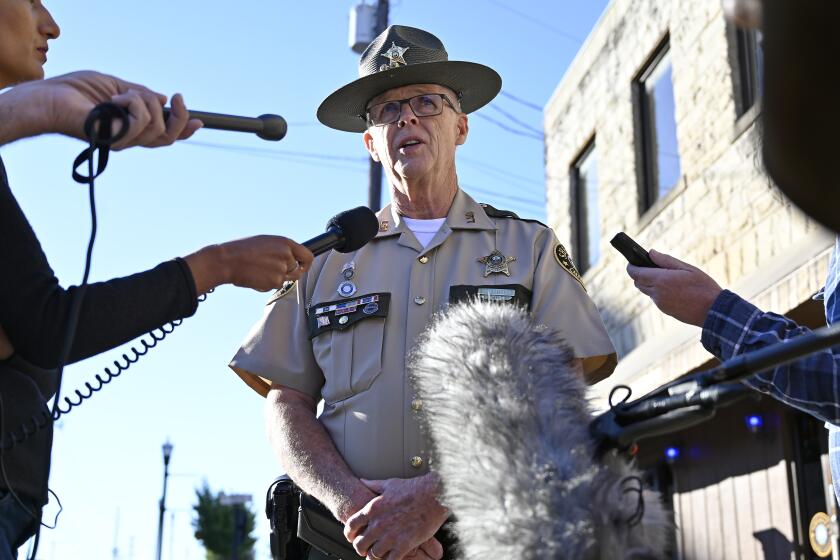Watchdogs, not lapdogs
STUART W. BOWEN JR.’S job is to investigate alleged waste, fraud and mismanagement of the U.S. tax dollars being used to rebuild Iraq. He’s done that job so well that he is himself under investigation.
This is no surprise to me. Since assuming the post of special inspector general for Iraq reconstruction in 2004, Bowen has issued one damning report after another documenting the misuse of billions of dollars that should have been used to restore Iraq’s economy and civil society. In doing so, he has embarrassed the Bush administration and its allies in Congress. Embarrassing them has proved to be something that an inspector general does only at his peril.
But the law, and principle, require inspectors general to call things as they see them and let the political chips fall where they may. The position was created by the Inspector General Act of 1978 so that federal agencies would have an independent, internal watchdog to ensure that they are run effectively, efficiently and in accordance with the law.
In the Bowen case, it’s worth noting that those making the allegations were all fired or demoted by him -- and that last year the Republican-controlled Congress tried to abolish his office altogether. Also, the investigation surfaced last week, right on the heels of Bowen’s latest scathing report that concluded, in essence, that the Iraq reconstruction to date has been an expensive failure.
The accusations against Bowen in and of themselves are not that serious -- that, for example, he exceeded his jurisdiction by investigating a particular matter and inflated estimates of how much money his investigations have saved taxpayers. Of course, if Bowen actually engaged in wrongdoing, he should pay the price. And, in any event, there should be a thorough (and prompt) investigation. But my bet is that this investigation is really about muzzling this particular watchdog and silencing others who might contemplate speaking similar truths to power.
This hunch is based on personal experience. During my time as inspector general of the Department of Homeland Security, I, like Bowen, issued one report after another documenting the misuse of tax dollars as well as the more serious failure, time and again, to close gaping holes in our nation’s security. I too was investigated (for not investigating a matter I deemed beyond my jurisdiction in my previous post as State Department inspector general). No wrongdoing was established, mind you. But the result was that my nomination to serve in a permanent capacity (I’d received a recess appointment) stalled in the Senate, and I ultimately lost the support of the White House.
Like the eight U.S. attorneys whose firings have captured the attention of Congress, several inspectors general have recently drawn the administration’s fire for putting principle before politics. (The head of the General Services Administration went so far as to call its inspector general a “terrorist.”) So now is a good time for Congress to consider changes in the law to make it easier for principle to prevail.
To start, inspectors general should be appointed to a fixed term, removable only for cause. At present, they serve at the “pleasure of the president,” meaning they can be fired for any reason at any time. The scandal at the Justice Department shows why such subjective evaluation is ill-suited for officials who are supposed to be apolitical in the discharge of their duties.
Additionally, inspectors general should submit their budget requests directly to congressional appropriators. Currently, the approval of the White House and the head of the agency are required first -- which means that an independent and aggressive inspector general is more likely to get budget cuts than increases.
Next, we need to change the leadership of the committee that investigates wrongdoing by inspectors general. The head of that committee is the deputy director of the Office of Management and Budget, which is part of the executive office of the president. For the last few years, the occupant of that post has been Clay Johnson III, a longtime friend and aide to President Bush.
Simply put, the White House should not be in charge of investigating officials who are supposed to be independent of it. During my time as inspector general at the Homeland Security Department, Johnson vigorously urged my counterparts and me to sign a statement of principles that, while innocuous in its particulars, had the overall effect of discouraging us from investigating or reporting anything that the administration might deem embarrassing.
Finally, Congress should eliminate the legal provisions that allow the heads of certain agencies (the Homeland Security, Justice and Treasury departments, for instance) to block inspector general investigations into sensitive matters on national security grounds. Agency heads can use this as an excuse to protect themselves and the administration from simple embarrassment.
These changes make good policy and political sense. Congressional Democrats will see it as in their interest to empower inspectors general to investigate the Bush administration more vigorously. And Republicans should realize that eventually there will be another Democratic administration.
The key to making government effective is holding it accountable. And a key way to hold government accountable is to make inspectors general more effective.
More to Read
Sign up for Essential California
The most important California stories and recommendations in your inbox every morning.
You may occasionally receive promotional content from the Los Angeles Times.










